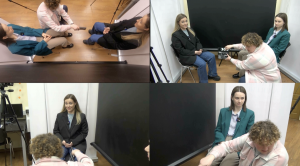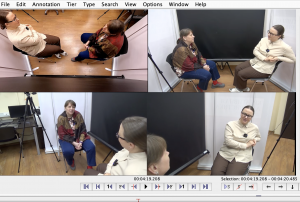THE ROLE OF RECURRENT GESTURES IN DIFFERENT LANGUAGES: SOCIOCOGNITIVE FOUNDATIONS OF POLYMODAL POSITIONING
(PROJECT UNDER GRANT 24-18-00587)
2024-2026
The present project is devoted to a cross-cultural comparison of the role of recurrent gestures in dialogic positioning, which is seen as a sociocognitive process underlying the expression and agreement of viewpoints by speakers. In contrast to the recurrence of verbal units, the recurrence of a gesture is not so much the fact of its repetition in discourse as its belonging to a certain group of gestures, which in a given culture have a stable relationship between formal, content and functional characteristics. Such stability determines a higher degree of conventionalisation of these gestures, and thus a more obvious variability of their properties in different cultures.
Despite the fact that a number of studies have identified gestures with similar properties, the concept of recurrent gestures as a separate category is used only in a few studies (Bressem, Müller 2014; Harrison, Ladewig 2021). The analysis of the variability of the properties of such gestures has been carried out mainly in relation to individual gesture ‘families’ (e.g., discarding or cyclic gestures) and, as a rule, within one language (English, German, etc.).
The task of comparative analysis of recurrent verbal-gesture complexes in dialogues in several languages is relevant for modern linguistics, since it allows us to develop a sociocognitive concept of recurrence in relation to the non-verbal component of speech, to propose a refined typology of recurrent gestures for different languages, and to reveal the nature of variation of polymodal behaviour in speakers of different languages in similar contexts.
The project is relevant for modern cognitive studies of language due to the need to identify the sociocognitive foundations of spontaneous interactions in the course of which positioning takes place. Positioning (stance-taking) has been described in some detail in relation to linguistic phenomena (Benveniste 1957; Biber, Finegan 1989; DuBois 2007; Verhagen 2008; Jaffe et al. 2009), but in the verbal-gesture aspect, it has been investigated very limitedly (Kendon 2004; Grishina 2017; Nikolaeva 2018; Andries et al. 2023). In the project, for the first time on the material of two languages – Russian and Portuguese (Brazilian variant) – the task of developing a methodological framework for the comparative study of recurrent gestures in dialogic speech from a sociocognitive perspective is solved, and an empirical study is carried out to determine the features of variation of this type of gestures in speakers of these languages.
The novelty of the project lies in raising new research questions about recurrence as a polymodal phenomenon, about the relationship between gesture recurrence and the sociocognitive phenomenon of positioning; in proposing new hypotheses about the features of variation of the characteristics of recurring gestures in different linguistic cultures; in clarifying the nature of the joint use of verbal and gesture markers of positioning in two languages; in applying integrative methods of polymodal analysis to a new linguistic material – Russian and Portuguese speakers
The practical value of the research consists in using the results to improve the effectiveness of communication in different languages. The formed polymodal corpus will enrich the collection of existing corpora and form the basis for further empirical research. The collected materials can be used for training neural networks, for example, for automatic recognition of gesture behaviour of speakers when they express a particular point of view.
Project results for 2024
A methodology (attitudes, methods and procedures) for the analysis of recurrent gestures and positioning in polymodal speaking behaviour has been developed. Methods and procedures for the collection and analysis of empirical material of oral informal dialogic communication in Russian were developed and will be applied to a similar study of Portuguese (Brazilian version) in 2025 and 2026. Video and audio materials of dialogues of 20 participants discussing the problem of AI impact on humanity were collected and integrated. Data from 20 subjects (10 pairs) on subtypes of potentially recurrent gestures and on private positioning categories for Russian has been obtained, processed and analysed. The analysis of material from 20 speakers with a total duration of about 165 minutes allowed us to systematise potentially recurrent gestures by the nature of movement and form into 43 subtypes. The distribution of potentially recurrent gestures and types of positioning in the studied material has been established. Regarding the joint use of gestures and positioning types, high variability was found both in the use of individual gesture types with positioning types and in participants’ individual use of multimodal combinations. Three articles were published: 1) Alan Cenki “Variable embodiment of stance-taking and footing in simultaneous interpreting” // Frontiers in Psychology (2024) scopus, rsci, and other, elibrary, White List; 2) Iriskhanova O.K., Petrov A.A. “Stance-taking from multimodal perspective” // Issues in Cognitive Linguistics (2024) scopus, rsci, other, RSCI, ‘White List’, Q1; 3) Kiose M.I. “Metaphor in Language and Gesture: What can gesture say about the stability of linguistic metaphor in oral discourse?” // Foreign Languages in Higher Education (2024) and, elibrary. Based on the results of the project 10 reports were made at international and all-Russian scientific conferences. The methodology and material of the project formed the basis of two undergraduate studies (supervised by O.K. Iriskhanova).


